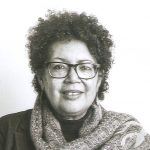Project Personnel
A Black People’s History of Canada Project is backed by a team of senior scholars and graduate students in the field of African Canadian history, led by principal investigator Dr. Afua Cooper, award-winning historian and author.
Dr. Afua Cooper is a multidisciplinary scholar, author, and artist. Her 13 books range across such genres as history, poetry, fiction, and children’s literature. Her indomitable research on slavery, and Black history has made her one of the leading figures in African Canadian studies, and the authority on Canadian slavery. Her book on Canadian slavery, The Hanging of Angelique: The Untold Story of Slavery in Canada and the Burning of Old Montreal broke new ground in the study of Canadian and Atlantic slavery.
Dr. Cooper led the “Universities Studying Slavery” initiative at Dalhousie University and was the lead author of the subsequent report Lord Dalhousie’s History on Slavery and Race. These initiatives revealed the connections between the Canadian academy and the Atlantic slaving systems. Furthermore, she has curated and co-curated nine exhibits on slavery, and Black history. In 2021, Prof. Cooper was appointed as the Canadian representative for UNESCO’s International Scientific Committee Slave Route Project, whose main objectives is to conduct research on the Transatlantic slavery system and its legacies. A celebrated poet, in 2020 Dr. Cooper was Awarded the Portia White Prize, Nova Scotia’s highest recognition for the arts. She is also the winner of the J.M. Abraham Atlantic Poetry Award for her poetry book Black Matters.
Afua Cooper currently teaches in the Faculty of Arts and Social Sciences at Dalhousie University, where she holds a Killam Research Chair, and co-ordinates the Black Studies Minor.
As a result of her scholarship and praxis, Dr. Cooper was awarded a one-million-dollar grant from the Department of Canadian Heritage to direct the A Black People’s History of Canada project. From 2011 to 2017, Dr. Cooper was the James Robinson Johnston Chair in Black Canadian Studies at Dalhousie University, Halifax. Dr. Cooper is also the founder of the Black Canadian Studies Association, an organization that she chaired for ten years, and the Dalhousie Black Faculty and Staff Caucus.
Afua Cooper earned her Ph.D., in history from the University of Toronto. Her fields of study included African history, Islam in Africa, Caribbean history, Canadian and North American history, Slavery and Abolition, Black education, the Black Press, Women and Gender history, and the African Diaspora.
Adrienne Shadd is a consultant, curator, and author who has conducted research for plaques, films, and exhibits, including ‘I’ll Use My Freedom Well,’ an exhibit at Uncle Tom’s Cabin and Black Mecca: The Story of Chatham’s Black Community. Most recently she has collaborated on the Black heritage of ‘The Ward’ neighbourhood for installation at the new Ontario Courthouse just north of Osgoode Hall, Toronto. She is the author, co-author and editor of several books and articles, including The Journey from Tollgate to Parkway: African Canadians in Hamilton (2010), The Underground Railroad: Next Stop, Toronto! (2002, 2022) with Drs. Afua Cooper and Karolyn Smardz Frost; “We’re Rooted Here and They Can’t Pull Us Up”: Essays in African Canadian Women’s History (1994) and Talking About Identity: Encounters in Race, Ethnicity and Language (2001), with Dr. Carl James. She has also collaborated on the award-winning children’s publication, Freedom (2014), and Early Civilizations of Africa (2015), both part of the Sankofa Heritage Collection, with Rubicon Publishing. Adrienne has been recognized with the William P. Hubbard Award for Race Relations and the J.C. Holland Award for Arts Achievement for her research and writing. She is currently working on a book on Toronto settler and freedom seeker, Deborah Brown.
Natasha Henry is an award-winning author and an award-winning curriculum development consultant. A respected historian with both a B.Ed and M.Ed., she has been an educator for 22 years specializing in the development of learning materials that focus on the African Diasporic experience. Natasha was the 2017 recipient of the ETFO Curriculum Development Award. The current president of the Ontario Black History Society, she is is a PhD candidate in the Department of History at York University. The 2018 Vanier Scholar is researching the enslavement of African people in early Ontario. Her publications include Emancipation Day: Celebrating Freedom in Canada (June 2010), Talking about Freedom: Celebrating Freedom in Canada (2012), a number of youth-focused titles including The African Diaspora (2014) and African Canadian Firsts (2014) in the Sankofa Black Heritage Collection by Rubicon Publishing. Firsts received the 2014 Gold Medal Moonbeam Children’s Award for Multicultural Non-Fiction. She has also written several entries for the Canadian Encyclopedia on African Canadian history. Through her various professional, academic, and community roles, Natasha’s work is grounded in her commitment to research, collect, preserve, and disseminate the histories of Black Canadians.
Interested in Black history and the eradication of anti-Black racism from an early age, Channon Oyeniran’s keen interest and passion in these areas helped her realize that she must do all she can to educate others and raise awareness of the rich history of Black people. She is an honours graduate, with a bachelor’s degree in history and Caribbean studies from the University of Toronto, a master’s degree in slavery studies from the University of Hull, UK, a certificate in adult education from George Brown College, and she is currently undertaking her PhD at Queen’s University. Channon is the founder of Oyeniran Education Support (OyES), an educational organization that helps individuals and institutions align with their intrinsic value and gifts, and nurtures them to greatness. She uses the OyES platform to teach people about the Black experience and Black history in Canada and internationally. Channon Oyeniran was born in Scarborough, Ontario, but is a long-time resident of the Durham region. She currently resides in Pickering with her husband and two sons.

Charisma Grace Walker
Charisma Grace Walker is well-known for her leadership role as a consultant to African Nova Scotian communities, Black students, and educational institutions in the province of Nova Scotia. With her initial educational and professional background in science and health care (Bachelor of Science degree in nursing) from Jamaica, she worked hard to enhance the well-being of African Nova Scotians as a health coach at Diabetes Canada from 2017 to 2019. She holds combined honours in social anthropology and psychology from Dalhousie University, with a graduate degree in education and counselling from Acadia University. Walker’s support for students’ needs and concerns was noticeable during her tenure as the first African Nova Scotian/Black student & Community Liaison at Saint Mary’s University, 2020-2021. With her training in equity and diversity, Charisma worked as the director of Opportunity and Belonging, Nova Scotia College of Art and Design, 2021-2022. Over the years, the versatile Charisma Grace Walker’s passion for Black history and the need of African descendants in the Diaspora to know more about their roots has grown profoundly as she delivers unmatched value in coordinating internal and external resources to achieve the objectives of BPHC. Alongside her role as project and finance manager, Charisma is a registered therapist currently pursuing a PhD in clinical sexology with the International Institute of Clinical Sexology (IICS).

Soliel Gibson
Soliel Gibson’s professional journey began in the medical field as a physiologist with specialization in exercise and rehabilitation in the Bahamas after her studies at Oakwood University (a Historically Black College and University) in Huntsville, Alabama. After receiving her bachelor’s degree in 2014, Soliel acquired a master’s degree in kinesiology and exercise science from Life University, after which she worked closely with the YMCA of Metro Atlanta as a wellness coach. Her fervour for knowledge and desire to explore different career paths brought her to Nova Scotia, where her administrative training and experience developed. Valued for her multi-tasking, analytical abilities and attention to detail and deadlines, Soliel is also skilled at handling payroll tasks, record keeping, scheduling, data processing and organizing
operations that support the BPHC team. She is devoted to community service and has been a member of such clubs and organizations as Rotary International and Souls Harbour Rescue Mission in Halifax. Outside of her professional duties, Soliel loves to spend time volunteering, listening to international news, travelling and expanding her knowledge of Black, African and Caribbean history.

Benedicta Appiah
Benedicta Appiah is a public relations practitioner whose experience and training over the years include facilitating client inquiries, producing and managing organizations’ social media pages, as well as press and media relations, and negotiating the best prices in advertising. Benedicta has driven successful advertising campaigns in both for-profit and non-profit organizations. With a bachelor’s degree in communication studies from Ghana, Benedicta has also worked in the educational institution and non-profit organization arena as an assistant programs and communications coordinator for more than two years. Appiah recently acquired her master’s in public relations from Mount Saint Vincent University as well as professional training in customer service. Aside from her training in public relations, Benedicta has a passion for fashion, which has motivated her exploration into the history of Black fashion, the story of African fabrics, and their contribution to the global economy. She loves to spend her free time creating fashionable pieces and learning new techniques. As the web content and communications specialist, Benedicta brings to the BPHC project a high level of dedication, creativity, and customized service for success.

Catherine Bourgeois
Research &Outreach Coordinator
Catherine Bourgeois is a writer, researcher, and storyteller from Halifax, Nova Scotia. She recently graduated with an MFA from the University of King’s College and is also an alumnus of Saint Mary’s University. Her academic research has appeared in the Canadian Journal of Behavioural Science and Evolutionary Behavioural Sciences. Yet her focus (and joy) is cemented firmly in writing narrative non-fiction specializing in Canadian stories, mainly from Atlantic Canada, spanning the genres of mystery, history, culture and crime.

Justin Loma
Manitoba Black History Coordinator
Justin Loma’s professional background is in architecture and planning. He is currently pursuing a Doctor of Design program at the University of Calgary, Faculty of Architecture, Planning and Landscape. His interest is in ancient technologies that have potential applications for mitigating floods and droughts.
His work for the BPHC, though brief, focuses on searching the prairie archives and libraries and learning from oral history the innovative spirit and contribution of the people of African origin to Manitoba, Canada and the world at large.
The people whose spirits and innovations to community building stand tall against the odds of time from the 1700s to the current. He is interested in learning about the various innovative contributions of black people to Canadian society and how black people innovated communities and built their own spaces to thrive in. Despite the hurdles they faced and continue to face from the past and present forces of slavery, colonialism, settler colonialism, racism, discrimination and segregation.

Itai Kuwodza
Research Coordinator
Itai Kuwodza has an interdisciplinary master’s degree from Saint Mary’s University with aspirations to pursue a Ph.D. Her current research work in Atlantic Canadian Studies including an original thesis titled Performing Diversity: Black Bodies in Atlantic Canadian Post-Secondary Institutions, has been a two-year passion project driven by a desire to understand how race permeates higher education to shape and exploit the experiences of Black students. Itai sees herself as an academic activist because decolonizing education is an act of activism and advocacy.





